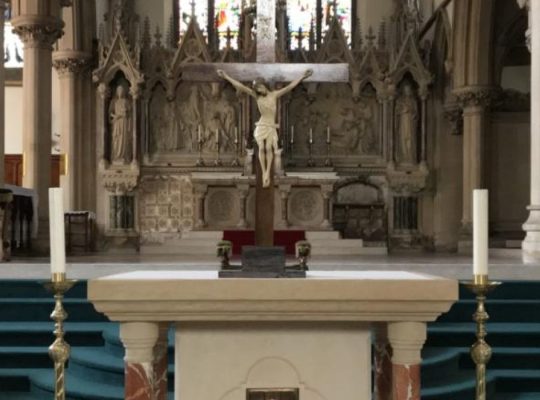Just a Thought
In his Letter to the Philippians, Saint Paul bears witness to his indomitable faith and hope. He is in prison and has no idea of what the future holds for him. But he is sure of one thing: whatever may be the outcome of his trial, the cause of the gospel will be strengthened. Bolstered by his conviction, he exhorts his correspondents: far from losing courage, they should continue bravely to fight the good fight, while preserving unity in humility, in mutual service.
Suddenly, his. Tone changes. The subject changes and becomes a paean of praise. The hymn to Christ that the apostle recalls at this juncture was undoubtedly used in the liturgy of his day. In a few verses, it speaks movingly of the journey undertaken by The Son of God made man, who lowered himself even to death on a cross, and who, ‘because of this,’ was raised by God his Father above every name.’ Here we see revealed the meaning of all the trials endured by the Christians and by the Church, and we are assured that victory lies at the end of our Pasch, as it did at the end of the Lord’s.
‘Though he was in the form of God’.—That is, God himself — Christ Jesus died on the cross. How could that have happened? How is it that he did not escape from those who wanted his death? Doesn’t this ignominious death contradict all that we say about him and all that we believe? In any case, this death remains one of the most formidable of stumbling blocks along the path to faith, for the sarcasms heard on Calvary have not ceased to be heard, and all the faithful, at least on some occasions, can hardly escape some degree of uneasiness: ‘He trusted in God; let him deliver him now if he wants him. For he said, ‘I am the Son of God.’’ But the Church and Christian teaching have never sought to diminish the horrendous nature of this scandal, even when many consider it an unacceptable contradiction. On the contrary, it embraces it. The Church has always affirmed that Jesus of Nazareth, the Christ, is true God and true man; and he truly died on the cross. ‘He did not regard equality with God something to be grasped,’ although he certainly kept the ‘form of God’ — that is his divine nature. But he never was intent upon jealously keeping this right for himself or deriving glory from it; he did not consider being equal to God some sort of prize to fight for.The journey and comportment of the New Adam are exactly the opposite of those of the first. In fact, the first Adam, who was but a man, wanted to usurp divine nature, something that was not his to begin with and never could be.
Christ Jesus, ‘rather……emptied himself, taking the form of a slave’: he ‘emptied’ himself. This does not mean that human beings who are created in the image of God are nothing, or that the ‘human likeness’ is something to be despised; it also does not mean — if such a thing were even imaginable — the ‘form of God’ is not like an article of clothing that one puts on and takes off. He is the Word — the Son, Second person of the Holy Trinity, and this ‘Son, The Son of God, was born in the likeness of humankind and found human in appearance.’ Without losing any of his divinity, he ‘became flesh,’ ‘servant,’ even slave, he renounced the appearance of his glorious divinity that Peter, James, and John glimpsed on the mountain of the Transfiguration. But incarnation was only the first and necessary stage of the ‘emptying’ that the Son of God freely consented to. ‘He humbled himself, becoming obedient to death, even death on a cross!’The eternal Son of God undergoes death, the bitter fruit of sin, and a death reserved for criminals! At such a sight, reason flounders and words fail: only silent adoration can express something of the feelings that well up from the depths of the heart, especially if one remembers that through baptism our flesh, with its passions and its selfish tendencies, was crucified with Christ ‘so that we might live in newness of life.’
For when Christ reached the depths of his ‘form of slave,’ ‘God greatly exalted him and bestowed on him the name that is above every name, that at the name of Jesus every knee should bend, of those in heaven and on earth and under the earth, and every tongue confess that Jesus Christ is Lord…..’ There is a relationship of cause and effect between the humbling of the Servant and the glory of the Lord: it is because he was obedient even unto death that he was raised up. What is more, this ‘exaltation’ — we should perhaps say ‘super exaltation’ — can only come from God, for it goes beyond all human possibilities, as well as imaginings: it is without equal. Similarly, the name given to the Lord was ‘above all names’because there exists. No name that can adequately express his dignity. What is true of God is true of him. Saint Gregory of Nysa said this: I have called him by every name one can think of, but not one could express his dignity. For how could one find a name commensurable with him who is above all names.’ In other words he says: ‘To say the name of God is legitimate and necessary, on condition of being conscious that none of the names we give him can ever express him fully or adequately.’
To call Jesus ‘Lord’ is, ultimately, the best way for the disciples to speak of him. For in fact this title belongs to him alone and expresses his absolute transcendence and his role as the risen One seated at the right hand of God. The goal of all preaching is to bring all people to acknowledge in Jesus, ‘obedient to death, even death on a cross,’ the Lord whom God has ‘exalted ….. above every name,’ the King of the universe. To say, ‘Jesus, the Lord’ is one of the most ancient expressions of faith, certainly the most fundamental and the one that ensures salvation. And no-one can say, ‘Jesus is Lord, except by the Holy Spirit.’ ‘For, if you confess with your mouth that Jesus is Lord and believe in your heart that God raised him from the dead, you will be saved.’
The Hymn of the Letter to the Philippians proclaims the paradoxical glory — yet the only true one — of him who manifested the ‘humility of God.’ Through the cross of his humiliation and his glory, Christ Jesus took over the leadership of humanity redeemed from the folly of Adam. Deceived by the serpent, Adam had disobeyed, thinking that He could become like God. By obediently accepting death, ‘even death on a cross’, ‘God greatly exalted’ the new Adam. Through his Pasch, he opened up to all humanity the path that reaches to God, and he reconciled the entire cosmos to the creator of heaven and earth and all that they contain.
So tell me what do you see when you gaze upon the cross, a stumbling block along the path to faith. An ignominious death of a criminal. Or, do you see, your God bleeding and dying — so that man may be reconciled. A love which is beyond all love. God dying for man, so that man may have eternal life.
‘A centurion cries out ‘surely this is the Son of God.’
‘Seen in the light of Easter, the cross is not an infamous gibbet on which Christ died, but the throne of his glory.’
If we still doubt who we see when we gaze upon the cross, Saint John tells us in no uncertain terms what has been revealed to him —that it is the Logos. The divine Word. The true light come into the world: And as Jesus reveals:
‘When the Son of Man is lifted up then you will realize that I AM….’(John 8:28).


